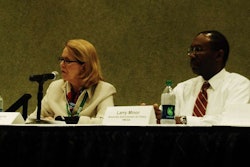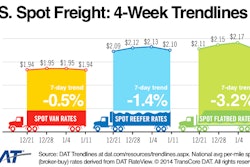
The New Entrant testing regulations would apply to motor carriers, brokers and freight forwarders.
CCJ sister site Overdrive‘s Senior Editor Todd Dills attended the listening session. Below is some of the feedback he gathered from those who offered input at the session. Click here to read his entire story.
The agency will conduct two more listening sessions this year — One March 28 at the Mid-America Trucking Show in Louisville, Ky., and the other April 7 at the meeting of the Commercial Vehicle Safety Alliance Alliance in Los Angeles.
Hunter Owen, National Association of Small Trucking Companies:
Owen’s group represents owner-operators and small fleets. A potential training component of a new entrant testing rule was a major part of the discussion at the session, and Owen said the agency should keep the rule focused on testing the knowledge of new entrants relative to federal regulations while allowing the private sector to train new entrants for the exam — and the operation of a trucking business. His association holds training sessions each month, he said, to help potential new carriers prepare for the FMCSA-required audit and to teach new carriers how to operate safely.
The training, he said, should be more than just teaching for what’s on a new entrant exam.
Owen also responded to an online commenter who questioned whether an owner-operating leasing his or her truck to a larger carrier needed to fall under the New Entrant rule.
Owen said the agency should keep the test focused on solely the “principal of the company” — the person getting the authority.
Nancy O’Liddy, Transportation Intermediaries Association:
O’Liddy’s group represents brokers, who are also subject to the New Entrant rule. O’Liddy said her group’s broker certification programs that focus on regulatory and business topics could service as a model for the agency when crafting testing regulations for new brokers.
Allen England, Tennessee Highway Patrol:
England said state enforcement agencies could have a role in the administration of the test, as they’re already responsbiel for performing audits on new entrants within the first 18 months of a carrier gaining authority.
Owen, however, again dissented, saying having carriers wait up to a year to get their authority would hurt businesses trying to get off the ground.
Bill Quade, FMCSA:
The agency’s associate administrator, Quade, said the agency currently is only working on a test for new carriers, and that existing businesses would not be affected. Some commenters did say, however, that events like metrics showing unsafe activity could spur a retesting or recertification.
He also explored the issue of how tests would be specialized for different segments or divisions: Legally they would need three tests he said, one for brokers, one for household goods movers and one for other carriers. But there may be a need to break the “other carrier” section into more specific tests, like hazmat, passenger or freight, he said.
He also touched on test failures, posing questions like: When would those that fail be allowed to retake the test? How often can you take the test? And how much of the agency’s oversight resources be devoted to letting those who fail retake it.
Other issues raised at the session:
Recertification: One question explored at the session was whether it would be beneficial for carriers to be retested every five years, to ensure motor carriers and others in the industry have an ongoing knowledge of federal regulations. David Gray of the North American Transportation Services Association wrote to the listening session that the process could be tied to the MCS-150 process. If that were the case, it could potentially help improve the quality of data FMCSA uses in its Compliance, Safety, Accountability program, as it uses data from the MCS-150.
Test Administration: Most at the session advocated for in-person proctored testing. Owen, however, said the agency should explore online testing, which would keep the cost reasonable for new businesses.











